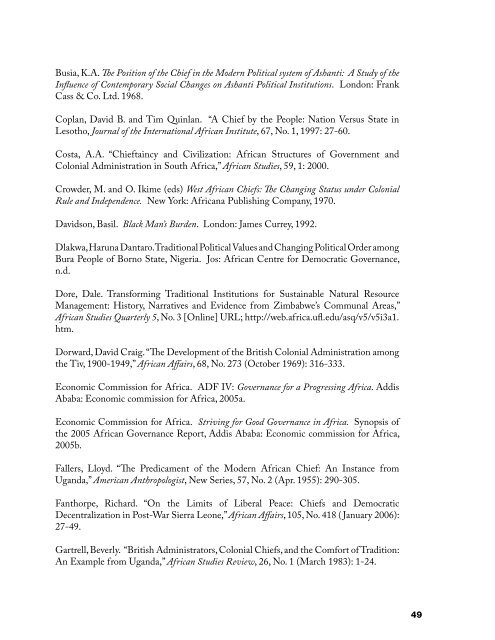Relevance of - United Nations Economic Commission for Africa
Relevance of - United Nations Economic Commission for Africa
Relevance of - United Nations Economic Commission for Africa
Create successful ePaper yourself
Turn your PDF publications into a flip-book with our unique Google optimized e-Paper software.
Busia, K.A. The Position <strong>of</strong> the Chief in the Modern Political system <strong>of</strong> Ashanti: A Study <strong>of</strong> the<br />
Influence <strong>of</strong> Contemporary Social Changes on Ashanti Political Institutions. London: Frank<br />
Cass & Co. Ltd. 1968.<br />
Coplan, David B. and Tim Quinlan. “A Chief by the People: Nation Versus State in<br />
Lesotho, Journal <strong>of</strong> the International <strong>Africa</strong>n Institute, 67, No. 1, 1997: 27-60.<br />
Costa, A.A. “Chieftaincy and Civilization: <strong>Africa</strong>n Structures <strong>of</strong> Government and<br />
Colonial Administration in South <strong>Africa</strong>,” <strong>Africa</strong>n Studies, 59, 1: 2000.<br />
Crowder, M. and O. Ikime (eds) West <strong>Africa</strong>n Chiefs: The Changing Status under Colonial<br />
Rule and Independence. New York: <strong>Africa</strong>na Publishing Company, 1970.<br />
Davidson, Basil. Black Man’s Burden. London: James Currey, 1992.<br />
Dlakwa, Haruna Dantaro. Traditional Political Values and Changing Political Order among<br />
Bura People <strong>of</strong> Borno State, Nigeria. Jos: <strong>Africa</strong>n Centre <strong>for</strong> Democratic Governance,<br />
n.d.<br />
Dore, Dale. Trans<strong>for</strong>ming Traditional Institutions <strong>for</strong> Sustainable Natural Resource<br />
Management: History, Narratives and Evidence from Zimbabwe’s Communal Areas,”<br />
<strong>Africa</strong>n Studies Quarterly 5, No. 3 [Online] URL; http://web.africa.ufl.edu/asq/v5/v5i3a1.<br />
htm.<br />
Dorward, David Craig. “The Development <strong>of</strong> the British Colonial Administration among<br />
the Tiv, 1900-1949,” <strong>Africa</strong>n Affairs, 68, No. 273 (October 1969): 316-333.<br />
<strong>Economic</strong> <strong>Commission</strong> <strong>for</strong> <strong>Africa</strong>. ADF IV: Governance <strong>for</strong> a Progressing <strong>Africa</strong>. Addis<br />
Ababa: <strong>Economic</strong> commission <strong>for</strong> <strong>Africa</strong>, 2005a.<br />
<strong>Economic</strong> <strong>Commission</strong> <strong>for</strong> <strong>Africa</strong>. Striving <strong>for</strong> Good Governance in <strong>Africa</strong>. Synopsis <strong>of</strong><br />
the 2005 <strong>Africa</strong>n Governance Report, Addis Ababa: <strong>Economic</strong> commission <strong>for</strong> <strong>Africa</strong>,<br />
2005b.<br />
Fallers, Lloyd. “The Predicament <strong>of</strong> the Modern <strong>Africa</strong>n Chief: An Instance from<br />
Uganda,” American Anthropologist, New Series, 57, No. 2 (Apr. 1955): 290-305.<br />
Fanthorpe, Richard. “On the Limits <strong>of</strong> Liberal Peace: Chiefs and Democratic<br />
Decentralization in Post-War Sierra Leone,” <strong>Africa</strong>n Affairs, 105, No. 418 ( January 2006):<br />
27-49.<br />
Gartrell, Beverly. “British Administrators, Colonial Chiefs, and the Com<strong>for</strong>t <strong>of</strong> Tradition:<br />
An Example from Uganda,” <strong>Africa</strong>n Studies Review, 26, No. 1 (March 1983): 1-24.<br />
49
















